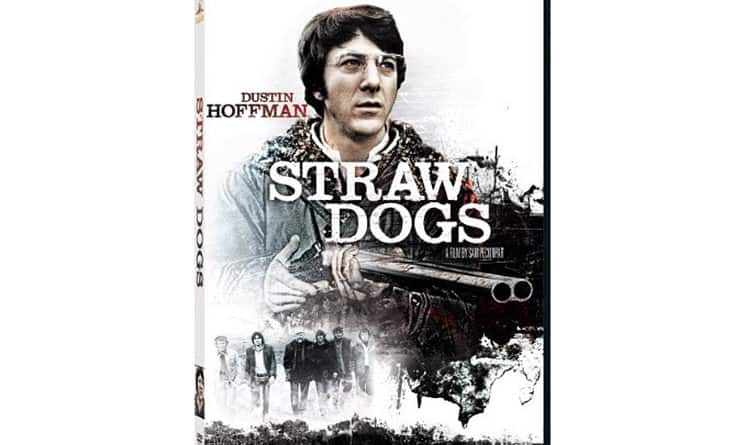“Straw Dogs”
ABC Pictures, 1971
Starring: Dustin Hoffman, Susan George, David Warner
Directed by: Sam Peckinpah
The plot: American college professor David Sumner (Hoffman) is on sabbatical in a desolate part of Cornwall with his young English wife, Amy (George). The local village is Amy’s hometown, and she has a history here. The local villagers, especially the rough-hewn young men, are amused, contemptuous, and jealous of the small, bespectacled egg-head Yank. This group of thugs is ostensibly doing repair work on the couple’s lonely stone cottage, but they take every opportunity to annoy and humiliate David, even killing the pet cat. Several of the men take David on a hunting expedition for game, but others use his absence as an opportunity to rape Amy. David accidentally strikes a mentally handicapped man, Henry Niles (Warner), with his car, and brings Niles home to attend to his injuries. Earlier, Niles had inadvertently strangled a flirtatious young girl in town. Now the group of louts, drunk and angry, is out for blood and kicks. They besiege the couple in their home, and all hell breaks loose.
Why it’s good: Lacking the breathtaking vistas of the American West, Peckinpah turned his love of nature on the Cornwall Coast, underscoring the beauty and the isolation. The multi-angled camera-work and use of slow-motion and diamond-sharp editing techniques he perfected in “The Wild Bunch” are all brought to bear here. Peckinpah and David Zelag Goodman wrote a tight piece of cinema while seriously undermining and even perverting the intentions of Gordon M. Williams’ novel, “The Siege of Trencher’s Farm.” Hoffman brings his method immersion to the part of the timid, cerebral, and, above all, repressed David with finely nuanced results. George shows a genuine subtlety that would serve her well in future fine performances in some really bad films. The suspense as David defends his home and its inhabitants builds masterfully with bagpipes, man-traps, boiling oil, and mutilations of all sorts.
The legacy: As a director, Peckinpah had an arguably noble vision of the death of the American West and the disappearance of the rugged individuals who forged it. His vision was best exemplified in “Ride the High Country,” “Major Dundee,” and his unqualified masterpiece, “The Wild Bunch.” On set, he was a bully and a tyrant, heavily influenced by a rainbow of substances. His hard-earned machismo, and what he saw as its diminishment in modern men, were as intractable as Yukio Mishima’s objections to post-war Japan. Peckinpah’s agenda was at its worst in his most controversial film, “Straw Dogs.” He dismissed Williams’ novel as garbage. In the book, Henry Niles is an actual child-killer; “Straw Dogs” makes him an innocent. In the book, the murdered girl is a child victim; in “Straw Dogs,” the accidentally killed girl is a sexually precocious adolescent. In the novel, there are no rapes; in the movie, there are two (which caused a hell of a lot of controversy). Peckinpah’s message seems to be that we all need to be capable of tapping our inner fascist to rise to desperate measures. The 2011 remake is worthless, but the Criterion Collection DVD is as wonderful as you might expect.

